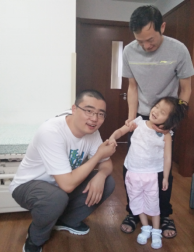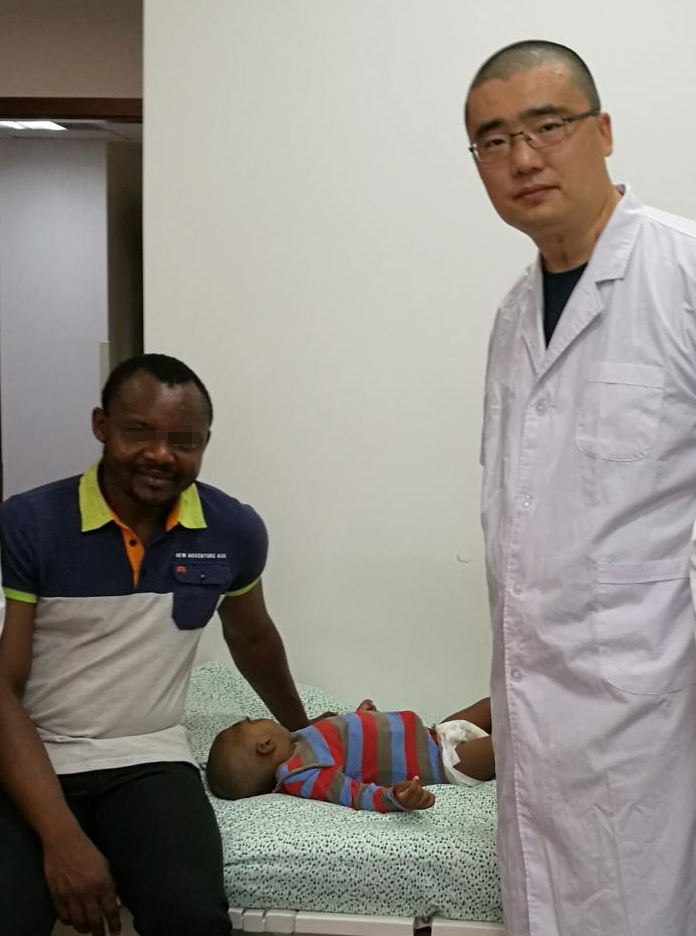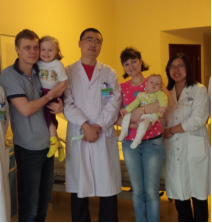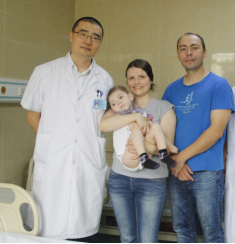
Kolya, who entered the world full - term, yet the start of his life was anything but smooth. From the very moment he took his first breath, he was connected to a ventilator, fighting for every ounce of oxygen.
The challenges Kolya faced right at birth were staggering. Tests revealed that his left kidney was suffering from hydronephrosis, causing it to swell with trapped urine. His right hand was afflicted with a contracture deformity, making it difficult to open or close his tiny fingers. His neck was shorter than normal, and his shoulders were unusually narrow, which not only affected his physical appearance but also hinted at potential underlying skeletal issues.
Worst of all, his central nervous system was under severe compression, leading to abnormal physiological reflexes and alarmingly low muscle tension. As doctors delved deeper into his condition, the diagnoses of brain atrophy, maldevelopment, and epilepsy added to the long list of hurdles this brave little one had to overcome. But even in the face of such adversity, Alex's journey of hope and recovery had just begun.
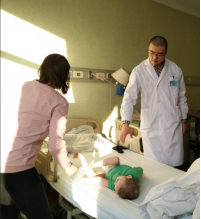
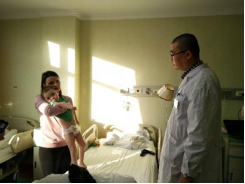
1.Can not lift head, cannot sit alone, cannot speak, cannot walk, but can turn over;
2.Waist strength and limb muscle strength are weak;
3.Suffers epilepsy.
4.Body temperature regulation dysfunction and body temperature is unstable
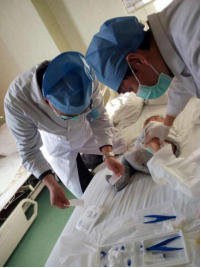
1. The patient's appetite has significantly improved. His sleep quality has also taken a positive turn, with longer and more restful slumbers, allowing him to wake up feeling refreshed and energized.
2. Both the patient's hearing and responsiveness have seen remarkable progress. He can now detect sounds more clearly and react promptly to various stimuli, whether it's a spoken word or a sudden noise, which greatly enhances his interaction with the surrounding environment.
3. The strength in the patient's neck has increased noticeably compared to before. This new- found strength enables him to hold his head more steadily, improving his posture and facilitating better movement of the head, such as looking around and turning.
4. The patient's body temperature regulation has become much more stable. No longer experiencing wild fluctuations, his body temperature remains within a normal range, reducing the risk of associated health complications and contributing to his overall well being.

1. The body temperature has become stable, no longer fluctuating erratically. This consistent temperature is a positive sign for overall health, ensuring that the body's internal systems can function optimally without the stress of temperature variations.
2. A notable increase in muscle strength, which can potentially lead to more independent movement and the ability to engage in a wider range of activities.

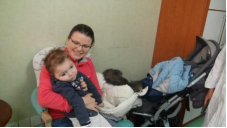
In the near future, extended sitting may progress to standing and eventually walking independently. This newfound mobility will open up a world of possibilities, from exploring the environment to participating in physical activities.
Moreover, enhanced muscle strength will also contribute to better posture and balance, reducing the likelihood of falls. Additionally, it can boost confidence and self-esteem. With consistent progress, the individual may gradually regain full functionality, integrating more actively into daily life and social activities, leading a more fulfilling and independent existence.
More detailed stories about Kolya’s treatment (click here)
Kolya’s Story
Kolya was the long-awaited child of his parents. His father worked in the museum and his mother was very gentle and virtuous. They carefully guarded this little life during pregnancy. Unfortunately, Kolya was born with a variety of congenital and serious diseases that affect normal growth and development. Kolya suffered a lot of pain. He got four pneumonias and had two operations. He eaten food through catheter. In order to maintain life, he had to accept various medicines injection. Despite life was hard, his parents made every effort to stabilize Kolya's condition and gave Kolya all the love.
Kolya was already 6 years old, but he still can't sit, can't walk and can't speak. His mother often took him to rehabilitation institution for physical therapy. Through training, he learned to eat with a spoon, his muscles became stronger, he learned to roll, and he could stand up with his mother help. Although it was very difficult, one day, Kolya smiled at his mother for the first time, her mother moved to tears.
However, in 2016, Kolya's situation deteriorated. His body temperature always raised to 38.5 degrees from time to time following breathing and sleep problems. His parents were very anxious for the frent seizures. In the past few months, his parents took Kolya to consult a lot of doctors in local hospitals. They always transferred from one doctor to another doctor, but once again and again, Kolya's situation still did not improve. Parents did not believe that fate would be so, they decided to go to the big hospitals in St. Petersburg and Moscow. After a series of tests, doctors found that the previously detected cerebellar atrophy began to develop rapidly, the death rate of brain stem cells also accelerated, and respiratory problems became more and more serious. But the doctors said they could do nothing.
Kolya's parents were helpless, but they still did not give up. They were told by people around them that a military hospital in China could treat cerebral palsy with stem cell. Dr. Cheng Hongbin from the hospital is a stem cell expert with rich clinical experience. Stem cells and Dr. Cheng, like two seeds of hope, gave hope to Kolya's future. But the cost of treatment was another challenge for this ordinary family. Thanks God, after months of hard work and funded by the Foundation, in January 2018, they flew to Beijing for the first time stem cell treatment with the only savings and raised money.
In the first course treatment, Kolya underwent four times lumbar punctures. After the first operation, a miracle occurred. Kolya's appetite and sleep quality improved, the reaction rate increased significantly, the neck and waist muscles seemed to be more powerful, and the body temperature was relatively stable. He preferred to smile at his parents. Parents were very pleased to see the improvement of Kolya's condition. Before returning to China, they thanked the hospital and Dr. Cheng Hongbin with a gift from Russia.
In order to get further improvement, in July 2018, Kolya and his parents flied to Beijing again for the second course treatment. And everything went smoothly. In October 2018, after 3 months, Kolya can sit alone for two minutes. When he falls, he can also try to support the body by elbows. The frequency of epileptic seizures is also significantly reduced at night. Parents are very satisfied with the treatment and hope to raise money in time for the third course of treatment in 2019.

